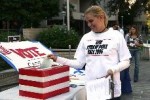Hundreds vote in student straw poll

Surrounded by dozens of campaign signs and the never-ending foot traffic near Cooper Hall, freshman Jay York was about 10 minutes into coloring in his votes when he handed his finished ballot to one of the dozens of volunteers.
The business management major said he follows politics closely and was glad to see students trying to get their peers interested in, and aware of, politics.
“It’s a lot more effective than those guys on campus who hold up signs and say, ‘If you don’t vote Republican you’re going to hell,'” he said.
Pi Sigma Alpha, along with Student Government, conducted a straw poll on campus Thursday in an effort to educate students on Nov. 7’s elections, as well as to get a feel for the student body’s political leanings.
Almost 700 students stopped to fill out the survey, which was completed on a Scantron sheet that corresponded with a three-page ballot.
“We were really pleased with the turnout,” said Susan MacManus, political science professor and advisor to USF’s chapter of Pi Sigma Alpha.
Students tended to vote Democratic (among the 336 that revealed their political party, 58 percent said they were Democrat, 41 percent said Republican and 29 percent said Independent or Other).
“The younger vote in Florida has been trending Democratic for the last couple of elections,” said MacManus, who is also a political analyst and often appears on political television shows. “In fact, in 2004, the strongest vote for (John) Kerry was the young vote.”
Democratic gubernatorial candidate Jim Davis edged his Republican opponent Charlie Crist, obtaining 48 percent of the students’ votes to Crist’s 41 percent. A Quinnipiac University poll released on Monday showed Crist with a 4-point lead.
The race for Florida’s open U.S. Senate seat was the straw poll’s most lopsided result, with Democratic incumbent Bill Nelson receiving 57 percent to Republican Katherine Harris’ 36 percent. A Quinnipiac University poll released Wednesday resembled the straw poll, with Nelson leading Harris 64 percent to 29 percent.
Democrat Kathy Castor, who is running for the U.S. House and is the daughter of former USF president Betty Castor, easily beat Republican opponent Eddie Adams Jr. 49 percent to 38 percent.
Roughly 30 volunteers combed the campus, from Cooper Hall to the Phyllis P. Marshall Center, the Library and the Engineering Building – even to inside classrooms – for about four hours, asking students to vote.
Organizers said they expected to have a turnout of about 500 voters.
“I though the turnout was absolutely phenomenal,” said Kristine Zooberg, interim president of USF’s Pi Sigma Alpha chapter and a teaching assistant. “I think it stirred up a lot of excitement.”
Pi Sigma Alpha (the National Political Science Honor Society), conducted a similar straw poll in 2004 for the presidential election. About 800 students voted.
MacManus said she was a bit surprised by how many students stopped to vote this time.
“Normally, turnout goes down in the general public in a non-presidential year election,” she said. “We got more than we thought we would.”
But while nearly every participant voted for particular candidates, a significant amount left their votes on amendments blank.
MacManus said that’s a frustrating part of elections.
“It really signals some of the educational issues we have,” she said. “I wasn’t surprised that they skipped over them because so many people in the general public do, too. It’s hard to get information about them ,so voters tend to be frustrated by them. I wish there were ways people could become more easily educated about the amendments. And these results show the frustration of the voters that we don’t have enough information.”
Participants voted on amendments ranging from budgeting and planning, constitutional amendments, tobacco issues, homestead exemptions, disabled veterans’ issues and eminent domain.
Organizers were pleased with the diversity of the students polled: 74 percent were white, 16 percent Hispanic and 11 percent were black. The remaining 7 percent filled in “other.”
“It was great diversity,” Zooberg said. “It’s what we wanted. USF is known for it’s diversity and this poll reflected that.”
This is the fifth straw poll the honor society has conducted, and it has higher hopes for the next one.
“We learned so much this time,” said Senate president Barclay Harless, who worked closely with the project. “I think we can get 2,000 in 2008.”






